 Petzlover
Petzlover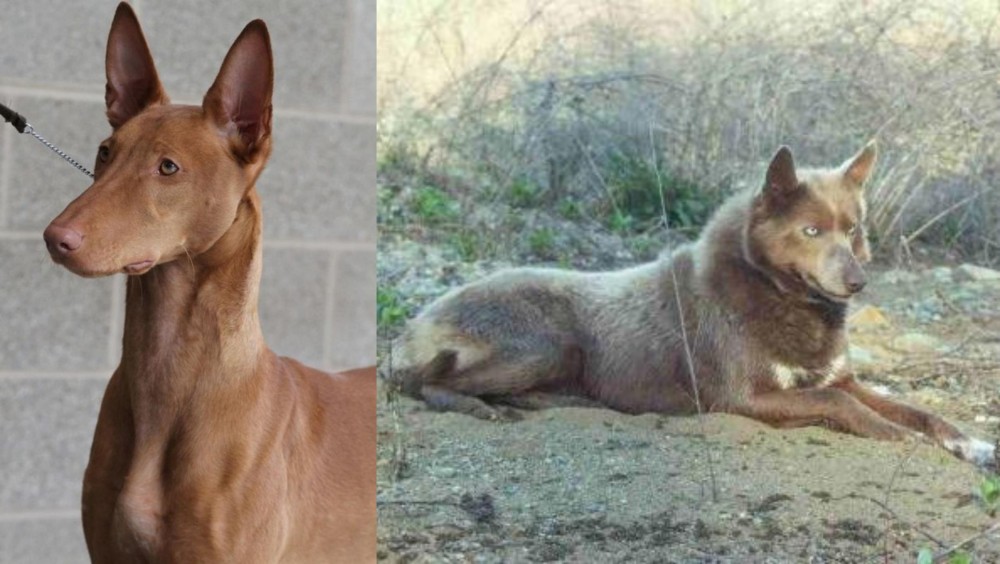 Pharaoh Hound is originated from Malta but Tahltan Bear Dog is originated from Canada. Pharaoh Hound may grow 20 cm / 8 inches higher than Tahltan Bear Dog. Pharaoh Hound may weigh 18 kg / 40 pounds more than Tahltan Bear Dog. Both Pharaoh Hound and Tahltan Bear Dog has same life span. Pharaoh Hound may have more litter size than Tahltan Bear Dog. Both Pharaoh Hound and Tahltan Bear Dog requires Low Maintenance.
Pharaoh Hound is originated from Malta but Tahltan Bear Dog is originated from Canada. Pharaoh Hound may grow 20 cm / 8 inches higher than Tahltan Bear Dog. Pharaoh Hound may weigh 18 kg / 40 pounds more than Tahltan Bear Dog. Both Pharaoh Hound and Tahltan Bear Dog has same life span. Pharaoh Hound may have more litter size than Tahltan Bear Dog. Both Pharaoh Hound and Tahltan Bear Dog requires Low Maintenance.
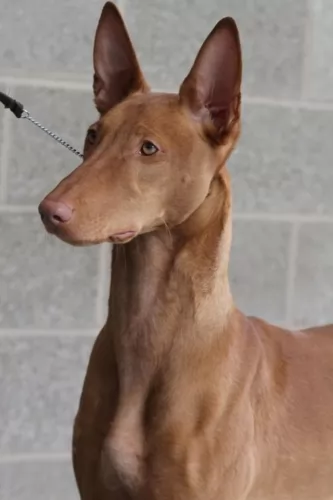 The Pharaoh Hound hails from Malta and is the national dog there. These dogs are rare and are looked upon as endangered. Because they are a primitive type dog, they enjoy good health.
The Pharaoh Hound hails from Malta and is the national dog there. These dogs are rare and are looked upon as endangered. Because they are a primitive type dog, they enjoy good health.
It has always been used as a hunting dog for rabbits. The dog has been recreated from mixing a combination of other breeds. It certainly seems to be an ancient dog breed, having existed for more than 2 000 years.
It is thought that the dog was imported to Malta by Phoenician traders. The dog has been classified as a member of the sighthound group, and arrived in England in the 1930s and to the USA in 1967. The breed was also officially recognized by the American Kennel Club in 1984.
 The primitive Tahltan Bear Dog comes from Canada. The dog was developed by the Tahltan people to hunt bears, so you can imagine he was a strong, brave dog.
The primitive Tahltan Bear Dog comes from Canada. The dog was developed by the Tahltan people to hunt bears, so you can imagine he was a strong, brave dog.
They also had fox-like yaps that confused bears until the hunter could come and kill the bear. These dogs are descended from pariah-type dogs with their diet being birds and fish.
It was in 1988 that the Canadian Post Office honoured the Tahltan Bear Dog by having a picture of it appearing on a stamp.
Some people claim that after the 1960s there are no longer any living descendants while others say that breeding projects were established and that there are still a few of these dogs around today. There are records on the other hand that claim the dog became extinct in the 1970s.
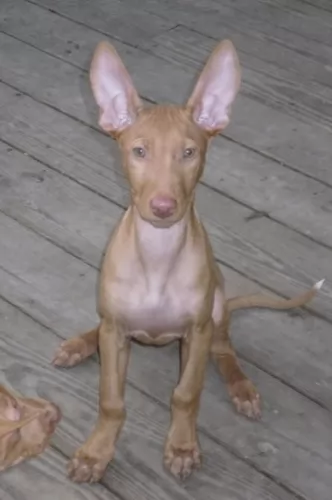 The Pharoah Hound is an elegant looking dog standing at roughly between 53 and 63cm and weighing 18 to 27kg.
The Pharoah Hound is an elegant looking dog standing at roughly between 53 and 63cm and weighing 18 to 27kg.
They are sleek dogs without any bulkiness about them and the coat is tight fitting with short smooth hair. The coat is a tan or red color, the eyes bright and the color of amber. The ears are fairly large and erect and the long tail slim with sometimes a white tip. The skin can be thin so the dog can be sensitive to the cold.
The neck of the dog is long and lean, as are the legs. An interesting aspect with this dog is that when the dog becomes excited its ears and nose become bright pink.
Pharoah Hounds are calm dogs and they can live in the city or in the countryside. They love kids and will be a wonderful playmate for them. Once he has had a lot of exercise and play, he is the kind of dog that will settle down happily with his human family for some quiet time.
Just as with any other dog, he will require training and socialization to make him obedient and better behaved.
 Not like a bear, but more foxy in appearance or even more like a husky, the Tahltan Bear dog is medium sized, standing at between 36 – 43cm in height and weighing between 6 – 9 kg.
Not like a bear, but more foxy in appearance or even more like a husky, the Tahltan Bear dog is medium sized, standing at between 36 – 43cm in height and weighing between 6 – 9 kg.
It is believed that they were similar to spitz and pariah type dogs, and were athletic. The short to medium length coat of the dog was mainly black or brown with some white.
He had fairly large pointed, erect ears and also a fairly pointed muzzle. The tail was interesting and was short and furry and always carried erect.
The Tahltan Bear Dog is fearless, not being deterred when meeting large bear. It's why the dog has been valued by hunters – their bravery and fearlessness.
They’re great family dogs too and will get on well with children. He is intelligent and easy to train if you want to give him training and socialization.
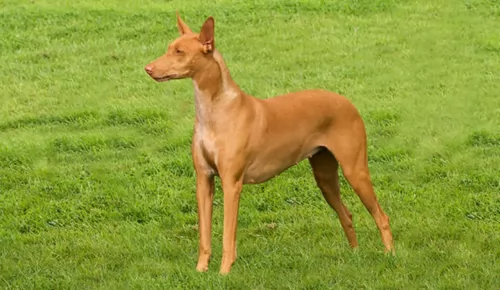 The Pharaoh Hound is quite interesting in a number of ways and he is independent, strong-willed and able to entertain and amuse himself.
The Pharaoh Hound is quite interesting in a number of ways and he is independent, strong-willed and able to entertain and amuse himself.
He loves to join in with the children and be part of their games. He’s intelligent and easily trained and he is also low maintenance.
While he’s not the most attractive dog to many people, others look at him as a true beauty. Whatever your opinion is, he will still make you a good family friend.
 Because some claim that this dog is extinct, there are only a few accounts of what he is actually like.
Because some claim that this dog is extinct, there are only a few accounts of what he is actually like.
Even though they were hunting dogs, they were devoted pets and companions of the people of the Yukon.
If these dogs are still to be found today, you will find them to be easy going, protective, loyal, intelligent, playful, alert, watchful and energetic. Just don’t allow them to get too hot as they prefer cooler climates.
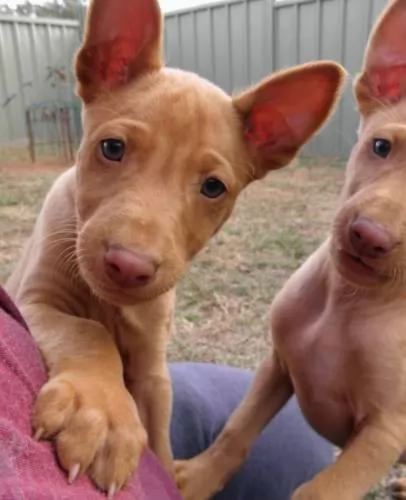 Pharaoh Hounds are uncommon outside of the Maltese Islands and with very little irresponsible breeding, these dogs are virtually free of genetic diseases. A common dog illness to look out for includes -
Pharaoh Hounds are uncommon outside of the Maltese Islands and with very little irresponsible breeding, these dogs are virtually free of genetic diseases. A common dog illness to look out for includes -
Your Pharaoh Hound can suffer from patella luxation, and in more severe cases it can be painful and even be disabling for a dog. This ailment comes about when the kneecap is dislocated from its normal position. You’ll find your dog lifting his hind leg quite a bit. Unfortunately this problem can lead to arthritis developing.
Other illnesses to look out for are bloat, cancer, skin allergies and ear infections.
 Healthy dogs are unlikely to pick up any of the many common dog illnesses there are. There are many – cancer, diabetes, bloat, hip dysplasia, ear infections, dental disease and many more.
Healthy dogs are unlikely to pick up any of the many common dog illnesses there are. There are many – cancer, diabetes, bloat, hip dysplasia, ear infections, dental disease and many more.
This is a contagious and infectious disease known as canine tracheobronchitis and which is transmitted through the air. Treatment is usually administered as a nasal spray, but your dog will need to get to the vet because of his dry, honking cough and lack of appetite.
This is a viral disease which in most instances is fatal. It is mostly transmitted when an animal that carries the disease bites the dog. Your dog develops behavior which is totally uncharacteristic of him. He'll also froth at the mouth and become aggressive. Death is nearly always guaranteed.
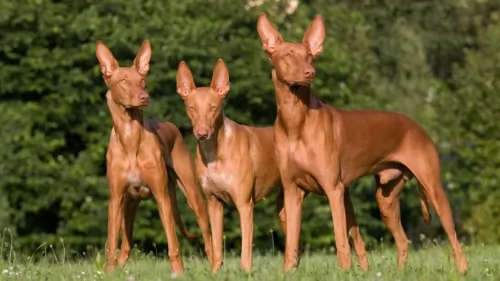 The Pharaoh Hound’s short coat is easy to groom and it will require a brushing at least twice a week just to get rid of loose hairs.
The Pharaoh Hound’s short coat is easy to groom and it will require a brushing at least twice a week just to get rid of loose hairs.
At the same time trim his nails, check inside his ears for infection and look inside his mouth for any rotting teeth.
Your Pharaoh Hound is an active, energetic dog and he will need a good dose of exercise every day. Take him with you on your walks or allow him to join you with your hikes, jogging or cycling. At home involve him in some ball games.
How much any adult dog eats will depend on a number of factors such as size of dog, age and his activity levels.
You get some excellent dog kibble these days on the market but the idea is to choose one of the high quality ones which have minerals and vitamins in them. Home-made food is also good for your pet and this should be kept simple, consistent and nutritious.
Every now and then you can add in some boiled chicken, brown rice or pasta and sweet potato, carrots and spinach to the kibble. Some raw meat added in can also be of benefit to your dog’s health.
Stay away from spicy, exotic foods and keep your dog's food easy like suggested so as to avoid digestive problems
 This double coated hunting dog’s thick coarse coat will require brushing at least twice a week to free the dog of loose hair. He is regarded as a low mainenance dog.
This double coated hunting dog’s thick coarse coat will require brushing at least twice a week to free the dog of loose hair. He is regarded as a low mainenance dog.
During brushing, you would check inside his ears and make sure there are no signs of redness. Eyes of the dog should be bright, eager and free of discharge.Always keep the nails of the dog trimmed.
If you keep your pet outside for any lengths of time it is imperative that this dog has shade to lie down in as he doesn’t do well in too much heat.
Because he is a hunting dog, he is used to being outdoors and being active. He wont be content to lie around inactive for too long. He’ll want at least a walk every day and some ball games.
A pet dog can’t choose his own food so they depend on us to make the right choices for them. It’s always convenient to have a packet of commercially manufactured dog food available, but who knows if this dog, which some claim is extinct, ever ate commercially manufactured food.
If he did, you would want to mix it every now and again with home made food - boiled chicken, sweet potatoes, brown rice or pasta, carrots and spinach. This food could be chopped up and added to the dog’s kibble.